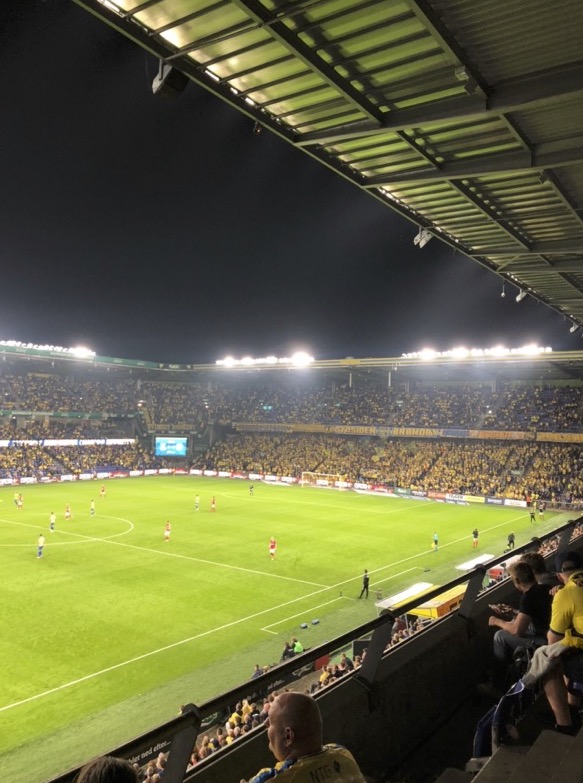
There’s a basic rule of stadium etiquette: If you have to go halfway down a filled aisle to get to your seat, but the row above or below is empty, you take the path of least resistance and climb up or down to your seat.
Upon arriving at Brøndby Stadium to see Brøndby IF, about 45 minutes from downtown Copenhagen via a walk, train, and jam-packed bus, I attempted this very maneuver but made a mess of it. My pants were just a little too tight, my legs too stiff.
My seat neighbor said something to me in Danish. I know six sentences in Danish. This, weirdly, wasn’t one of them. He surely spoke English, but there was no point in asking for a translation because the sentiment was clear enough. He was teasing me, but sympathetically, so I laughed with him.
Most Americans who fall in love with soccer have some notion that the atmosphere of stadiums in Europe and South America is fundamentally different from what we’ve grown up with. It’s easy to recall images seen on TV of elaborate choreography, crowds obscured by flare-born smoke clouds, and, well, a guy sticking a flare up his rear end. Soccer abroad is supposed to be unfamiliar, daunting, and rousing. You expect, and maybe even hope, for chaos and comical vulgarity. It’s supposed to be so ugly, it’s beautiful.
There was plenty of energy to be found. Music and chanting literally shook the stadium in the lead-up to kickoff. The ultras, organized fan groups, roared ludicrously the whole game. I saw a guy get so overstimulated that he poured a whole beer on his head. The first ten minutes were hectic. Fueled by the raucous crowd, Brøndby flew around like Liverpool. Their press was relentless and Silkeborg, the visiting team who were just ahead of Brøndby in the league table, couldn’t find a way out.
But after 20 minutes, something clicked. The crowd kept the same octave, but the game changed. Silkeborg slipped by the press and started to find some joy. They exploited the press again and again, and soon scored after Brøndby center-back Kevin Tshiembe lost the ball up the field, leaving space behind.
Fifteen minutes later, Tshiembe carried the ball into the same area, but this time made a key progressive pass. After some clever interplay at the top of the box, a clipped finish from Simon Hedlund floated over Silkeborg’s goalie. 1–1.
I expected the foreignness, the intimidation of an unfamiliar crowd. I didn’t expect to feel so comfortable, so familiar.
The big things—language, history, tradition—were different from any American sports experience I’ve had. But we still have plenty of small, mostly weird similarities.
Some guy laughing at you because you can’t climb over a seat, that feels about right. The train to the stadium, full of excited chatter, felt familiar. On the train home, a man was passed out across four seats, clutching a wine bottle. He was treated just as he would be here, with that special combination of mockery and genuine care reserved for overly intoxicated strangers. A passerby grabbed a random nearby bike helmet, wryly smiled, and wedged it on this poor guy’s head.
Forgive me, but even the rabid Brøndby ultras weren’t as different from the suburban dad-dominated fan groups of Hartford Athletic as you’d think. Both have drums, banners, and quirky traditions. Both have passion.
These little human reference points, however random, invite you to relax, to feel at home.
From there, it takes almost no effort at all to fuse into a crowd, helplessly joining something bigger than yourself. At first, it’s calculated engagement to fit in, but then something within you shifts. Suddenly, you care. In the 80th minute, I started biting my nails, and that’s not even a thing I do.
Late in the game, there was a clear handball in the box, and Brøndby should have had a penalty kick. I was, in my own reserved way, enraged. A lot of people were whistling. I wished I could whistle.
But that connection, really, is what’s special about sports. They generate artificial community and artificial meaning, but artificiality isn’t the same as emptiness. Sports make something out of nothing.
I arrived an ignorant stranger—I still am—at Brøndby and in Denmark, and that won’t change. But when a big chance flew over the bar, I, like everyone in the stadium, instinctively raised my hands to my head in disbelief because that’s what people do. I shared something with twenty-five thousand Danes. I can’t say that about many things (although now I also get to share their universal health care. Nice.).
After a two-goal first half with multiple swings of momentum, it felt like we were in for a shootout. Not to be. Neither side could get much flow in the second half, and the game finished 1–1.
We really could have used a win.
Will Slater can be reached at wslater@wesleyan.edu.


Leave a Reply